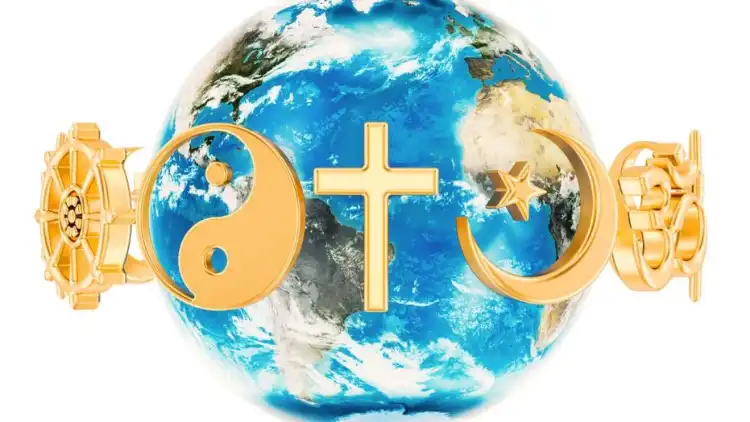Eternal Consequence: A Study of Hell and Heaven in Hinduism according to Lord Krishna and Bhagwat Gita

Hinduism is a complex and diverse religion with a wide variety of beliefs and practices. One of the central concepts in Hinduism is the idea of karma, which holds that the actions of an individual in this life will determine their fate in the next. According to this belief, there are two possible destinations for souls after death: hell and heaven.
In Hinduism, hell is a place of punishment for those who have committed evil deeds in their past lives. It is a place of suffering and torment, where souls are punished for their misdeeds. The length of time spent in hell varies depending on the severity of one’s sins, and it is believed that souls may be reincarnated multiple times before they are able to escape the cycle of rebirth and attain salvation.
Heaven, on the other hand, is a place of reward and bliss for those who have lived virtuous lives. It is a place of great beauty and happiness, where souls are able to enjoy the fruits of their good deeds. Like hell, the length of time spent in heaven varies depending on the virtues of one’s past lives, and it is believed that souls may be reincarnated multiple times before they are able to escape the cycle of rebirth and attain salvation.
According to Lord Krishna and Bhagwat Gita, the ultimate goal for human being is to achieve liberation from the cycle of rebirth and attain union with the divine. In Bhagwat Gita, Lord Krishna explains to Arjuna that the ultimate goal of human life is to realize the Self and to attain union with the divine. Lord Krishna teaches that the path to liberation is through the practice of yoga and devotion to the divine. He also teaches that the key to attaining salvation is to act selflessly, without attachment to the fruits of one’s actions.
In conclusion, Hinduism teaches that the ultimate goal of human life is to achieve liberation from the cycle of rebirth and attain union with the divine. The belief in karma and the concept of hell and heaven are central to this belief, with hell being a place of punishment for those who have committed evil deeds and heaven being a place of reward for those who have lived virtuous lives. According to Lord Krishna and Bhagwat Gita, the path to liberation is through the practice of yoga and devotion to the divine, and the key to attaining salvation is to act selflessly, without attachment to the fruits of one’s actions.
Hell and Heaven in Islam and according to Quran and prophet Muhammad

Islam, like many other religions, teaches that there is a life after death, and that the actions of an individual in this life will determine their fate in the next. In Islam, there are two possible destinations for souls after death: hell and paradise.
Hell, also known as Jahannam in Islam, is a place of punishment for those who have committed sins in their life. It is a place of intense suffering and torment, where souls are punished for their misdeeds. The duration of punishment in hell varies depending on the severity of one’s sins. According to the Quran, the punishment in hell is eternal and those who end up there will not be able to escape or die.
Paradise, also known as Jannah in Islam, is a place of reward and bliss for those who have lived a righteous life. It is a place of great beauty and happiness, where souls are able to enjoy the fruits of their good deeds. The duration of reward in paradise also varies depending on the level of righteousness of one’s past life. Like hell, Paradise is eternal and those who end up there will not die or be able to leave.
According to the Quran, the ultimate goal for human being is to attain salvation and enter paradise. The Quran teaches that salvation can be attained through the belief in one God (Allah) and following the teachings of the prophet Muhammad. It also teaches that the key to attaining salvation is to lead a righteous life, doing good deeds, and avoiding sins. The Quran emphasizes on the importance of following the Five Pillars of Islam, which are the declaration of faith, prayer, fasting, charity and pilgrimage, in order to attain salvation and enter paradise.
In conclusion, Islam teaches that the ultimate goal of human life is to attain salvation and enter paradise. The concepts of hell and paradise are central to this belief, with hell being a place of punishment for those who have committed sins and paradise being a place of reward for those who have lived a righteous life. According to the Quran, the path to salvation is through belief in one God and following the teachings of the prophet Muhammad, and the key to attaining salvation is to lead a righteous life, doing good deeds, and avoiding sins. The Five Pillars of Islam are also important in order to attain salvation and enter paradise.
Hell and Heaven in Christianity and according to the Bible

Christianity, like many other religions, teaches that there is a life after death, and that the actions of an individual in this life will determine their fate in the next. In Christianity, there are two possible destinations for souls after death: hell and heaven.
Hell, also known as eternal separation from God in Christianity, is a place of punishment for those who have rejected God’s love and salvation in their life. It is a place of intense suffering and torment, where souls are punished for their rejection of God’s love and grace. The Bible teaches that the punishment in hell is eternal, meaning those who end up there will be forever separated from God.
Heaven, also known as the Kingdom of God, is a place of reward and eternal life for those who have accepted God’s love and salvation in their life. It is a place of great beauty and happiness, where souls are able to enjoy the presence of God and the company of the believers. The Bible teaches that heaven is eternal, meaning that those who end up there will live in eternal joy and peace.
According to the Bible, the ultimate goal for human being is to attain eternal life with God in heaven. The Bible teaches that the only way to attain eternal life is through faith in Jesus Christ and accepting him as Lord and savior. It also teaches that the key to attaining eternal life is to lead a life of righteousness, following the teachings of Jesus and obeying God’s commands.
In conclusion, Christianity teaches that the ultimate goal of human life is to attain eternal life with God in heaven. The concepts of hell and heaven are central to this belief, with hell being a place of punishment for those who have rejected God’s love and salvation, and heaven being a place of reward for those who have accepted it. According to the Bible, the path to eternal life is through faith in Jesus Christ, and the key to attaining eternal life is to lead a life of righteousness and obedience to God’s commands.
What is common in Hinduism, Islam and Christianity?

Hinduism, Islam, and Christianity are all religions that have a belief in a life after death and that the actions of an individual in this life will determine their fate in the next. They all have some concept of heaven and hell and that the ultimate goal of human life is to attain a better afterlife.
Additionally, all three religions have a moral code or set of guidelines that individuals are expected to follow in order to attain salvation or a better afterlife. They all promote the idea of good deeds, and avoiding sins, They also promote the idea of leading a righteous life and doing good to others.
Another common aspect between these religions is the belief in one Supreme Being or God who is the creator of the universe and the ultimate authority. All three religions promote the idea of worshiping one God and seeking to have a personal connection with this higher power.
Furthermore, all three religions have a strong emphasis on the importance of community and the role of religious leaders or prophets in guiding individuals on their spiritual journey.
In summary, Hinduism, Islam, and Christianity are all religions that believe in life after death, the concept of heaven and hell, and the importance of leading a righteous life and following a moral code in order to attain salvation or a better afterlife. They also all believe in one Supreme Being or God, have an emphasis on community and the role of religious leaders or prophets in guiding individuals.
What is difference in Hinduism, Islam and Christianity?

Hinduism, Islam, and Christianity are all distinct religions with their own beliefs, practices, and history. Some of the main differences between these religions include:
- Concept of God: Hinduism has a complex concept of God and the divine, with multiple gods and goddesses, and belief in the ultimate reality of Brahman. Islam believes in one God and that is Allah, who is merciful and compassionate. Christianity believes in one God who is loving and personal, and who is revealed as the Father, the Son, and the Holy Spirit.
- Beliefs about the afterlife: Hinduism teaches that the soul goes through a cycle of rebirths, called reincarnation, and that the ultimate goal is to achieve liberation from this cycle. Islam teaches that individuals will be judged after death, and that those who have lived a righteous life will go to paradise, while those who have not will go to hell. Christianity teaches that there is a heaven and a hell, and that the ultimate goal is to attain eternal life with God in heaven.
- Scriptural basis: Hinduism’s main texts are Vedas, Upanishads, Bhagavad Gita, and the Puranas. Islam’s main text is Quran and Christianity’s main text is Bible.
- Role of Religious leader: Hinduism does not have a specific religious leader like prophet or messenger. But guru, who is spiritual teacher, is considered as a guide. In Islam, prophet Muhammad is the last prophet and messenger of God. In Christianity, Jesus is considered as the son of God, and savior of the world.
- Role of rituals: Hinduism has a rich tradition of rituals, ceremonies, and festivals that are performed at home, in temples, and at various sacred locations. Islam also has rituals such as prayer and fasting, but they are considered as a means of worship and submission to God. Christianity has sacraments like baptism, communion, and confirmation and they are considered as means of grace.
These are just a few of the main differences between these religions. Each religion has its own unique beliefs and practices, and there is much more to learn about each one.
